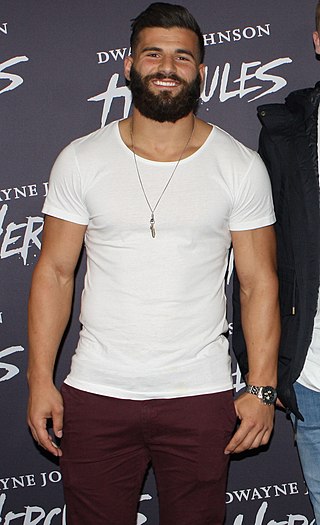
The 1995 Rugby League World Cup was held during October 1995 in the United Kingdom. It was the eleventh staging of the Rugby League World Cup and was marketed as the Halifax Centenary World Cup, reflecting the tournament's sponsorship and the fact that 1995 marked the centenary of the sport. Envisaged as a celebration of rugby league, the size of the competition was doubled, with four additional teams invited and England and Wales instead of Great Britain national rugby league team.
The Fiji national rugby league team, nicknamed the Bati, has been participating in international rugby league football since 1992. The team is controlled by the governing body for rugby league in Fiji, Fiji National Rugby League (FNRL), which is currently a member of the Asia-Pacific Rugby League Confederation (APRLC). Fiji have thrice reached the semi-finals of the Rugby League World Cup, in 2008, 2013 and 2017, and are currently ranked 6th in the International Rugby League's World Rankings. They are coached by Fijian Joe Dakuitoga, who was appointed in August 2020, and their captain is Kevin Naiqama.

The Lebanon national rugby league team represents Lebanon in rugby league football. Nicknamed "the Cedars" after the Lebanese cedar tree, the team was formed by Lebanese Australians in 1997 and have been administered by the Lebanese Rugby League Federation since 2002.

Petero Civoniceva, is a Fijian-Australian former professional rugby league footballer who played in the 1990s, 2000s and 2010s. A Queensland State of Origin and Australian international representative prop forward, in 2009 he broke the record for most international matches for Australia of any forward in history. Civoniceva played his club football for the Brisbane Broncos, with whom he won the 1998, 2000 and 2006 NRL Premierships, as well as for the Penrith Panthers, whom he captained. Late in his career whilst playing for the Redcliffe Dolphins in the Queensland Cup, Civoniceva captained the Fiji national team in their 2013 Rugby League World Cup campaign. The Petero Civoniceva Medal is awarded to the Australian Fijian rugby league footballer of the year, while the Civoniceva Medal is awarded to the Queensland Cup player voted as the best and fairest.
The Women's Rugby League World Cup is an international rugby league tournament, contested by the women's national team of the International Rugby League (IRL). The competition has been held since 2000 in Great Britain and since 2008 has been part of the Festival of World Cups. Under the current format, eight teams are separated into two groups of four with the top two qualifying for the semis.

Rodney Griffin is a Papua New Guinean professional rugby league footballer who plays as a prop, second-row and lock forward for the Northern Pride in the Queensland Cup. He is a Papua New Guinean international.

The 2003 Rugby World Cup was the fifth Rugby World Cup and was won by England. Originally planned to be co-hosted by Australia and New Zealand, all games were shifted to Australia following a contractual dispute over ground signage rights between the New Zealand Rugby Union and Rugby World Cup Limited. The pre-event favourites were England, regarded by many at the time as the best team in the world. New Zealand, France, South Africa and defending champions Australia were also expected to make strong showings, with New Zealand being second favourites after victory in the southern-hemisphere Tri-Nations championship.
Jermaine McGillvary is an English professional rugby league footballer who plays on the wing for the Huddersfield Giants in the Super League. He has played for the England Knights, England and Great Britain at international level.

Josh Mansour is a professional rugby league footballer who plays as a winger for Newtown Jets. He has represented Lebanon and Australia at international level.

The 2017 Rugby League World Cup was the fifteenth staging of the Rugby League World Cup tournament and took place in Australia, New Zealand and Papua New Guinea between 27 October and 2 December 2017. The tournament featured the national teams of 14 Rugby League International Federation member countries who qualified through either standing in the previous tournament or a series of qualification play-off matches. In the final, defending champions Australia, playing in their 14th consecutive final, defeated England at Brisbane's Lang Park.
The 2013 Rugby League World Cup final was the conclusive game of the 2013 Rugby League World Cup tournament and was played between New Zealand and Australia on 30 November 2013 at Old Trafford, Manchester, England. Australia won the final by 34 points to 2 in front of a sell-out crowd, finishing the tournament undefeated. They reclaimed the cup from New Zealand, who had defeated them in the 2008 final. The Kangaroos won the Rugby League World Cup for the tenth time, and the first time since 2000. Their five-eighth, Johnathan Thurston was named man-of-the-match.

The 1992 Rugby League World Cup final was the conclusive game of the 1989–1992 Rugby League World Cup tournament and was played between Great Britain and Australia on 24 October 1992 at Wembley Stadium in London, England. Australia won the final by 10 points to 6 in front of an international record crowd of 73,631. Australia, the defending champions, won the Rugby League World Cup for the 7th time.

The 1988 Rugby League World Cup final was the conclusive game of the 1985–1988 Rugby League World Cup tournament and was played between New Zealand and Australia on 9 October 1988 at Eden Park in Auckland, New Zealand. Australia won the final by 25 points to 12 in front of a New Zealand rugby league record attendance of 47,363. Australia, the defending champions, won the Rugby League World Cup for the 6th time.
The 1995 Rugby League World Cup final was the conclusive game of the 1995 Centenary World Cup tournament and was played between England and Australia on 28 October 1995 at the Wembley Stadium in London, England. Australia won the final by 16 points to 8 in front of 66,540 fans. Australia, the defending champions, won the Rugby League World Cup for the 8th time.

Tevita Pangai Junior is a Tonga international rugby league footballer who plays as a prop, second-row and lock for the Canterbury-Bankstown Bulldogs in the NRL.
The Papua New Guinea women's national rugby league team, also known as the PNG Orchids represents Papua New Guinea in Women's rugby league. They are administered by the Papua New Guinea Rugby Football League.

Stephen Crichton is a Samoan professional rugby league footballer who plays as a centre for the Penrith Panthers in the NRL and Samoa at international level.
The 2021 Rugby League World Cup knockout stage took place after the group stages of the 2021 Men's Rugby League World Cup, and ended with the Final, at Old Trafford. The quarter-finals comprised eight teams; the top two teams from each group; Group A, Group B, Group C and Group D. All quarter-finalists automatically qualified for the 2025 Rugby League World Cup.

The 2021 Rugby League World Cup (RLWC2021) was a collection of world cups in the sport of rugby league, held in England from 15 October to 19 November 2022. England won hosting rights for the competition on 27 October 2016. The bid received £25 million UK government support, partnered with the UK Cabinet Office as part of a commitment to the Northern Powerhouse, with 87 percent of all matches to be held in northern towns and cities. Organisers initially planned for the tournaments to go ahead between 23 October and 27 November 2021 despite the COVID–19 pandemic but withdrawals from Australia and New Zealand over "player welfare and safety concerns" caused the tournaments to be postponed – with the event's chief executive admitting that a World Cup without those teams would have lacked credibility.

The 2021 Rugby League World Cup final was the rugby league match to determine the winner of the 2021 Rugby League World Cup, played between Australia and Samoa on 19 November 2022 at Old Trafford in Manchester, England.















